Knife in the Water: Digitally Remastered Edition
As a director, it must be absolutely nerve wracking to go on set with a group of old hands who know exactly what they are doing and are just waiting for you to tell exactly where to stand, what to do and to carry on doing that until you say "cut". In his book It's Only a Movie, Mark Kermode recounts a conversation he had with Clive Barker who, on the first day of Hellraiser, walked on set and said "OK, so... what do we do now?" Even the great John Huston, whose debut feature was the brilliant film noir, The Maltese Falcon, went on to the set to find all the cast and crew members looking at him expectantly and he had no idea of what to do next. Finally, his assistant whispered "say 'action!'" and the rest, as they say, is history.
As I wasn't alive in 1962, I wasn't aware that there was a burgeoning new talent coming out of France called Roman Polanski, whose debut feature would dazzle audiences and critics alike, winning awards at several European film festivals and picking up a prestigious Oscar nomination for Best Foreign Film. Knife in the Water is notable not only because it is Polanski's feature film debut but it is also his only full length film not in the English language, but shot almost entirely in Polish. Polanski had been working in France as he was disillusioned with the Polish film industry and had to be coerced back to his native land in order to make a feature film.
The plot is remarkably simple and revolves around a wealthy sportswriter and his wife who are about to go on a yachting holiday when, in an argument about her driving, the man picks up a hitchhiker who he has nearly run over because he is convinced that that is what his wife wanted to do. When they reach the jetty where the yacht is moored, the couple's tempestuous relationship somehow drags the young man into their power struggle and onto the holiday boat with them. The man, Andrzej, and his wife, Krystyna soon relax and begin talking to the young man about where he is going, why he doesn't have a job and why he agreed to go with them when he can't swim.
In a film like this though, you know that it is only a matter of time before something terrible happens and, with each man desperate to prove their dominance and become the alpha male on the boat. With the young man also carrying a rather deadly looking knife, the sort that shoots straight up at the press of a button, you are so get the impression that this will prove to be intrinsic to the sudden turn in events whenever it happens.
As anyone familiar with Roman Polanski's upbringing will tell you, the man knows all about the cruel and aggressive side to human beings and even kind exteriors can only be a façade for something extremely malevolent within. I got the impression that Polanski brought a lot of this to Knife in the Water with the two men occasionally desperately struggling to curb their primal urges, especially when it comes to Krystyna who seems attracted to the handsome, blonde young man and occasionally bored by her slightly boorish husband who interrupts an evening of games to concentrate on a middleweight title fight from Ankara and complain that his employers have sent an idiot to cover the fight.
Despite all of this, the three of them generally get on very well despite the tensions bubbling just below the surface and, one morning when Krystyna has awoken well before the alarm clock and has gone to the deck for some fresh air, she is joined by the hitchhiker and the two passionately kiss. When Andrzej wakes up to find the two of them already up, he puts on his dressing gown and pockets their guest's knife. When the young man notices that his prized possession is missing and asks where it is, Andrzej admits to having the blade and the altercation that follows turns the mood dramatically.
Looking back on this after Polanski's remarkable career (which is by no means over, if The Ghost is anything to go by) it must have been abundantly clear to those who follow film closely that this young Polish filmmaker was a talent to be reckoned with and with a bright future. With hindsight, one can compare it to its other early films such as Cul-de-Sac and Repulsion, the other two monochrome films he made before relocating to America in order to make Rosemary's Baby. Strange as it may seem, Knife in the Water is easily the equal of these two films (and better than some of his output in the US) as it is made with such poise, elegance and skill that you know the director was really on the top of his game and the three actors (two of them having never previously acted) deliver quite remarkable performances, making each character slightly deeper than they could otherwise be and each having a side that you will like and also a flaw that will make them human. Although the actors playing the young man and Krystyna had to be dubbed, it doesn't show and the power of their performances isn't diminished.
Knife in the Water is a remarkable directorial debut and, although Polanski had made numerous short films prior to this, it is a testament to his talent as both a writer and director that he was able to make a film of such power and dramatic tension for his debut feature.
The Disc
Extra Features
Ticket to the West is a 30 minute documentary which reunites Roman Polanski with the two male actors (although they were all filmed separately) who all talk at length about various aspects of the film: how it came about following the Polish film school's relocation from Warsaw to Lodz and how Polanski had to be coaxed back from France to make the film which had been previously turned down by the Ministry. They go on to talk about the specifics of the film shoot and what it was like hitting the entire crew onto a small boat and what it was like working with two inexperienced actors.
Odeon Entertainment must have spent ages trawling through the television archives to find a Clive James interview with Polanski for the Repulsion disc, a South Bank Show special on Polanski for the Cul-de-Sac DVD and, for this disc, there is a 28 minute extract from the Russel Harty Show from 1976 in which he talks about his upbringing, having scabies and everything associated with the murder of his wife, Sharon Tate.
Rounding off the disc is a stills gallery and there are also trailers for this, Cul-de-Sac and Repulsion.
The Picture
This has been digitally restored and the monochrome picture looks suitably superb with excellent contrast, inky blacks and oiled skin that shimmers under the baking sun. The edges are nice and crisp without any hint of edge enhancement and, although there are a few instances of grain and slight print damage, these are few and far between and so slight that you only notice them if you are looking for them.
The Sound
Also digitally restored, the sound is extremely clear although most people will be almost entirely relying on the subtitles as the entire film is in Polish. The Dolby Digital 2.0 Mono soundtrack presents the dialogue extremely well although you can tell that some of it has been dubbed, with Polanski providing the voice of the young man. One of the major features of the film is Christopher Komeda's terrific jazz score which reminded me an awful lot of Bernard Herrmann's jazz inflected score for Taxi Driver. Music like that can really influence mood, enhancing the more uplifting moments but making of the darker elements seem even more ominous.
The sound is so well so well mixed that the sounds on board the boat seem extremely natural but, when the two men disembark to help guide the yacht from one lake to another, the sound of their bodies passing through the long grass is extremely harsh and cutting so it almost seems as if dry land is the alien environment.
Final Thoughts
knife in the Water is a remarkably good film, probably better than Cul-de-Sac and, in my opinion, the equal of Repulsion. Although it doesn't show anything that one could point out as being typical Polanski, it does seem to carry some themes that would be replicated later on in his career. As with the other two Roman Polanski DVDs, Odeon Entertainment have done a very good job with this with splendid AV quality and finding some really interesting retrospective interviews from a 2003 Blue Underground featurette which is complemented well by the Russel Harty interview from 1976.
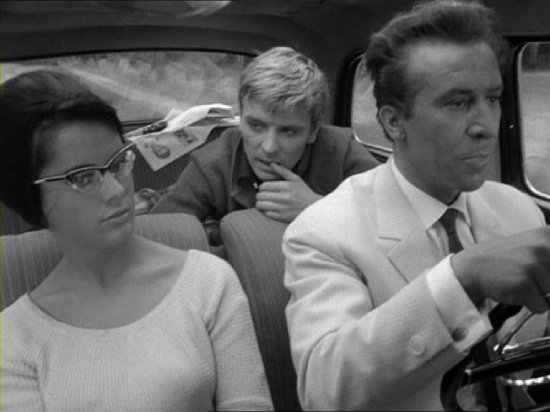
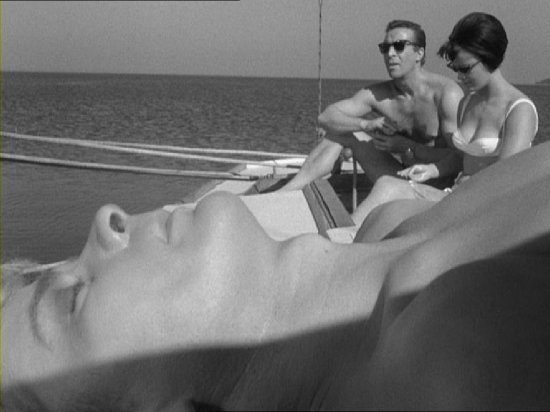
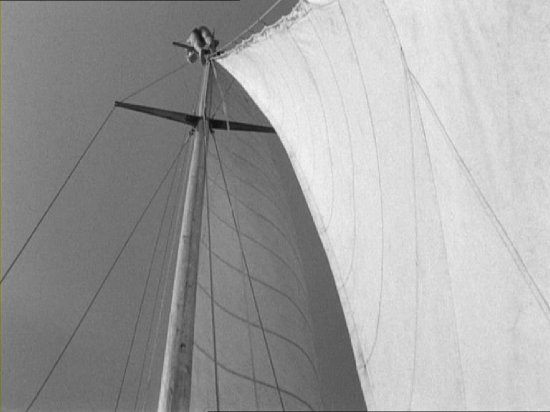
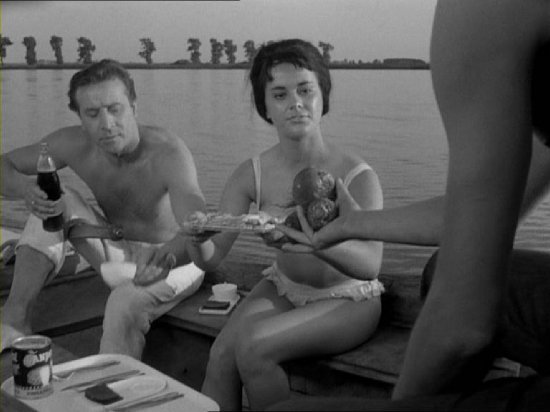
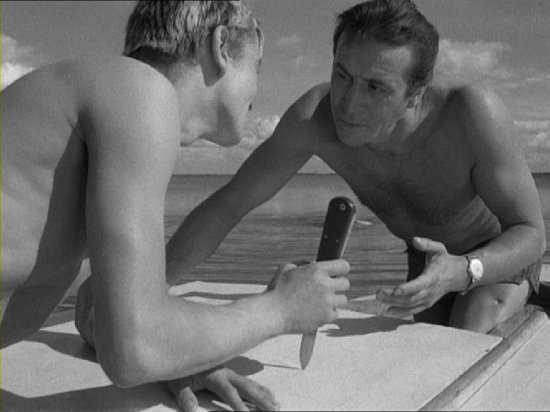
Your Opinions and Comments
Be the first to post a comment!